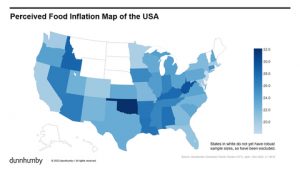Americans Think Grocery Store Profits, Inflation Higher than Reality
 Americans believe that grocery store profits are at a 35.2 percent net profit margin, 14 times higher than grocers’ actual net profit margin average of 2.5 percent, and that food-at-home inflation is 24.3 percent, double the annual rate reported by the U.S. Bureau of Labor Statistics according to the latest dunnhumby Consumer Trends Tracker. The CTT is part of the dunnhumby Quarterly, a strategic market analysis of key retail themes, with the third edition being focused on navigating uncertainty.
Americans believe that grocery store profits are at a 35.2 percent net profit margin, 14 times higher than grocers’ actual net profit margin average of 2.5 percent, and that food-at-home inflation is 24.3 percent, double the annual rate reported by the U.S. Bureau of Labor Statistics according to the latest dunnhumby Consumer Trends Tracker. The CTT is part of the dunnhumby Quarterly, a strategic market analysis of key retail themes, with the third edition being focused on navigating uncertainty.
n the third wave of the CTT, dunnhumby also found that despite perceived inflation reaching a new high, customers are coping a little better compared to the last wave of the report. Consumers who reported they would have difficulty covering an unexpected expense of $400 dropped from 64 peercent in July to 60 percent in November 2022. In addition, 48% of consumers reported they are getting the kind of food they want to eat compared to 43 percent in the second wave.
“In this latest wave of our CTT study, we found that retailers are in a precarious position with their brand perception, since customers are vastly over-estimating grocers’ store profit margins and inflation rates, while they themselves are battling food prices,” said Matt O’Grady, president of the Americas, dunnhumby. “Retailers need to show they are empathetic to customers through their prices, their rewards/loyalty offers, and with messaging to best support shoppers during these challenging financial times.”
Key findings from the study:
- Inflation worries are driving customer sentiment. When consumers were asked as part of the survey, why customer sentiment is the lowest it has been in 50 years, consumers responded by a five to one margin that inflation was the cause, with covid coming in a distant second. When asked about 2023, only 22 percent of respondents predicted inflation and the state of the country will get better. Forty-seven percent of respondents predicted inflation and the state of the country would improve three years from now. Over a five-year period, 54 percent of consumers are optimistic that their own finances and the state of the country will improve.
- Younger shoppers are most optimistic, but only in the short term. For 2023, 31 percent of consumers aged 18-34, believe their finances and the state of the country will get better, compared to just 13 percent of consumers over 65. Over a three and five-year timeframe however, there were no significant differences by age.
- Food insecurity remains a problem. Thirty-one percent of households reported they have skipped or reduced the size of a meal for financial reasons. Thirty-nine percent of respondents under the age of 44 have skipped or reduced meal sizes. And households with children at home are 8 percent more likely than adult-only households to have skipped or reduced meal sizes. Consumers living in Idaho, Oklahoma, Arkansas, Tennessee, and West Virginia reported the highest numbers, where over 40 percent had skipped or reduced the size of a meal in the last year. Consumers living in Washington, Minnesota, Michigan, Massachusetts, and Maryland reported the lowest numbers, with approximately 20 percent having skipped or reduced the size of a meal in the last year.
- While improving slightly, most consumers continue to struggle financially. No state is immune, but the states with the highest rate of financial insecurity (75 percent) are Oregon, Oklahoma, Louisiana, and West Virginia. The states with the lowest rates of financial insecurity (45 percent) are Minnesota, Wisconsin, Maryland and Delaware.
- Consumers want easy to shop and more convenient eCommerce solutions. Eighty-one percent (up 4 percent) of consumers say easy to shop websites and apps are important to them and 78 percent (up 4 percent) want retailers to have more convenient delivery and pick up time slots. For consumers aged 55 and over, ease and convenience are even more important. In this age group, 84 percent say easy to shop websites and apps are important to them and 81 percent want convenient delivery/pick-up time slots available. Families are 16 percent more likely to interact with a store’s app and have a 10 percent greater need for the retailer to pick products as well as they would, compared to shoppers without children.
- Consumers want retailers to help them make healthy choices. Forty-four percent of consumers reported it was very or extremely important for retailers to help them make healthy choices, an increase of 3 percent from the previous wave. In addition, 48 percent reported they choose healthy foods while shopping (up 2 percent), 40 percent read diet and nutrition information (up 2 percent) and 29 percent are buying products for a specific diet when they shop. The top five diets in the U.S. cited in the survey are 1) Keto, 2) Low carb, 3) Low sugar, 4) Vegetarian, and 5) Gluten free.
For this study, dunnhumby interviewed 6,012 consumers, representative of the U.S. grocery shopper nationwide. The online interviews for Wave 1 were conducted in April 2022, Wave 2 in July 2022, and Wave 3 in November 2022. Approximately 2000 individuals were interviewed for each Wave of the study.
The CTT study is designed to uncover shopper needs, perceptions and behavior over time, and to complement dunnhumby’s Retailer Preference Index which measures the strength of retailers’ customer value proposition. The dunnhumby Consumer Trends Tracker can be accessed today.
For more news of interest to the grocery industry, subscribe to Gourmet News.
Vollrath’s Bartelt Retires; Lampe to Join as CEO, President
 Erik Lampe will join the company in March to assume the position of president initially and then take over as CEO in June. He comes to Vollrath with a background in general management, strategic growth, innovation, and operational performance for industrial companies. He spent the majority of his career working for Oshkosh Corporation and McKinsey & Company, where he served in a variety of strategic leadership roles. For the last year, he worked as a principal for Comvest Partners’ Operating Advisory Group, where he served as a leader for the firm’s privately held companies, guiding them through the recent dynamic environment.
Erik Lampe will join the company in March to assume the position of president initially and then take over as CEO in June. He comes to Vollrath with a background in general management, strategic growth, innovation, and operational performance for industrial companies. He spent the majority of his career working for Oshkosh Corporation and McKinsey & Company, where he served in a variety of strategic leadership roles. For the last year, he worked as a principal for Comvest Partners’ Operating Advisory Group, where he served as a leader for the firm’s privately held companies, guiding them through the recent dynamic environment.Goya Foods Sends Food, Drinks to East Palestine, Ohio
 Goya Foods, through its Goya Gives global initiative, is sending ready-to-serve Goya food and beverages to the people of East Palestine and surrounding areas in response to the Ohio train derailment.
Goya Foods, through its Goya Gives global initiative, is sending ready-to-serve Goya food and beverages to the people of East Palestine and surrounding areas in response to the Ohio train derailment.
“The impact of this disaster is devastating on both the community and the environment. East Palestine has been treated like a forgotten town, and while this may be a small community, it is not a forgotten community by Goya. We are always present during moments of tragedy for all people in need,” said Bob Unanue, president and CEO of Goya Foods.
Goya products will be received and distributed with the help of Chaney Nezbeth, executive director of Way Station, a community resource for families and individuals in need.
“Being able to offer the residents of East Palestine food and beverages options that don’t require their tap water for preparation is something no one else had even thought of. The variety of items that Goya is providing is incredible and absolutely needed right now,” Nezbeth said.
Through Goya Gives, Goya is always at the forefront of natural disasters and humanitarian relief efforts, donating millions of pounds of food each year in the United States and worldwide. Most recently, Goya donated food to the people of Turkey and Syria.
For more news of interest to the food and beverage industry, subscribe to Gourmet News.






